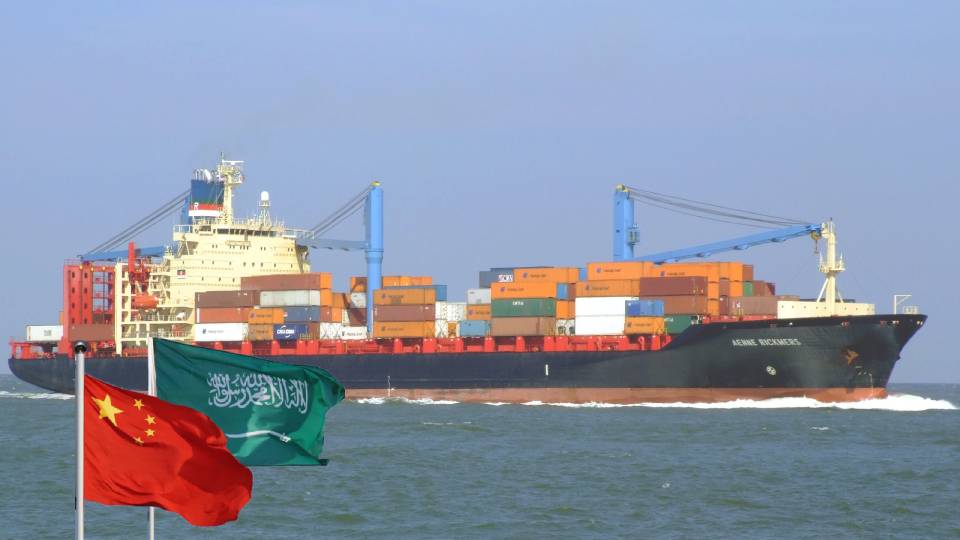- By TOP CHINA FREIGHT
- September 5, 2025
- Shipping
Table of Contents
Shipping from China to Saudi Arabia is a critical trade route that supports businesses in electronics, textiles, machinery, and construction. However, choosing the right logistics solution can be complex. Factors like transit time, customs clearance, and total shipping costs affect efficiency. This guide explores shipping methods, documentation, and best practices to simplify international freight management.

Why is shipping from China to Saudi Arabia important?
Saudi Arabia is one of China’s largest trading partners in the Middle East. Increasing demand for industrial goods, consumer electronics, and construction materials makes logistics efficiency crucial. Reliable freight services ensure on-time deliveries, reduce supply chain risks, and support business growth.
Moreover, as trade continues to expand, companies need to select between air, sea, and rail freight to balance speed and cost. The right choice depends on cargo size, urgency, and customs requirements.
What are the main shipping methods to Saudi Arabia?

Businesses shipping from China to Saudi Arabia typically choose between air freight, sea freight, and rail freight. Each method has unique benefits depending on cargo type.
| Shipping Method | Average Cost | Transit Time | Best For | Limitations |
|---|---|---|---|---|
| Air Freight | High | 3–7 days | Urgent, high-value goods | Expensive for bulky items |
| Sea Freight | Low | 20–30 days | Bulk commodities, containers | Longer lead times, port delays |
| Rail Freight | Medium | 12–18 days | Balanced cost and speed | Limited routes, customs procedures |
Sea freight is most cost-effective for full container loads (FCL), while air freight is ideal for electronics or time-sensitive cargo. Rail offers a middle ground with stable schedules.
How much does shipping cost from China to Saudi Arabia?

Shipping costs vary depending on cargo size, weight, and delivery urgency. Freight forwarders often calculate costs per kilogram for air shipments and per container for sea shipments.
| Cargo Type | Estimated Cost (USD) | Notes |
|---|---|---|
| Air Freight (per kg) | $5 – $10 | Fast but costly for heavy loads |
| LCL Sea Freight (per CBM) | $60 – $120 | Shared container, flexible for small shipments |
| FCL Sea Freight (20ft) | $1,200 – $1,800 | Suitable for medium-scale imports |
| FCL Sea Freight (40ft) | $2,000 – $2,800 | Best for bulk shipments |
| Rail Freight (per CBM) | $150 – $250 | Competitive pricing, eco-friendly |
What documents are required for customs clearance?

When shipping from China to Saudi Arabia, customs compliance is vital. Missing or incorrect documents can delay cargo release and increase costs.
| Document | Purpose |
|---|---|
| Commercial Invoice | Declares product value for customs duty |
| Packing List | Details cargo content and weight |
| Bill of Lading / AWB | Proof of carriage contract |
| Certificate of Origin | Confirms country of manufacture |
| SASO Certificate | Required for Saudi standards compliance |
| Import License (if needed) | Specific goods may require permits |
Additionally, Saudi Arabia enforces SASO and SABER certification to ensure product compliance with national standards. Importers must prepare early to avoid clearance delays.
How to choose between air, sea, and rail freight?

Each freight mode serves different business priorities.
| Criteria | Air Freight | Sea Freight | Rail Freight |
|---|---|---|---|
| Speed | ★★★★★ | ★★ | ★★★★ |
| Cost | ★★ | ★★★★★ | ★★★ |
| Reliability | ★★★★★ | ★★★★ | ★★★★ |
| Environmental Impact | ★★★ | ★★★ | ★★★★★ |
If speed is critical, air freight is best. If budget is the priority, sea freight is preferred. For companies balancing cost, reliability, and eco-friendliness, rail freight is an excellent choice.
What challenges may affect shipping from China to Saudi Arabia?
International shipping often faces challenges such as:
- Customs delays due to incomplete documentation.
- Port congestion at major terminals like Jeddah or Dammam.
- Seasonal demand surges during Ramadan or peak import months.
- Regulatory compliance with SASO and SABER certifications.
- Logistics disruptions from global trade fluctuations.
By working with an experienced freight forwarder, companies can mitigate these risks and maintain consistent delivery schedules.
Case Study: Electronics shipment from Shenzhen to Riyadh
A Saudi retailer needed to import consumer electronics from Shenzhen to Riyadh within two weeks. After comparing options, they selected air freight despite higher costs.
Cargo:
3 tons of electronics
Option 1 (Sea Freight):
$1,500, 25 days transit
Option 2 (Air Freight):
$8,500, 5 days transit
Result:
Goods arrived in Riyadh in time for product launch, ensuring maximum sales and brand reputation.
This case shows how businesses must weigh cost against delivery speed.
Should businesses consolidate shipments to save costs?
Yes, consolidating shipments can reduce logistics expenses. Less-than-Container Load (LCL) allows multiple businesses to share a container, lowering per-unit costs. However, consolidation may cause slight delays due to handling.
For urgent or high-value goods, Full Container Load (FCL) remains more secure and efficient. Businesses should evaluate shipment frequency and volume to select the right method.
Conclusion
Shipping from China to Saudi Arabia requires balancing speed, cost, and compliance. Air freight ensures speed, sea freight lowers expenses, and rail offers a balanced option. Preparing documents such as invoices, certificates, and import permits is essential for smooth customs clearance. Ultimately, selecting the right freight forwarder ensures timely delivery, minimized risks, and optimized logistics performance.
Need a Shipping Quote?
If you want expert guidance and peace of mind, our team is ready to assist.
TJ China Freight offers tailored solutions to help businesses of all sizes ship more reliably from China.

FAQs
Q1:What goods are restricted for import into Saudi Arabia?
Saudi Arabia restricts alcohol, pork, counterfeit goods, and certain electronics. Importers should verify prohibited items before shipping from China to Saudi Arabia to prevent fines or confiscation.
Q2:Can I track my shipment from China to Saudi Arabia?
Yes, most freight forwarders offer real-time tracking. Air and rail shipments provide precise updates, while sea freight tracking depends on carrier systems.
Q3:Do I need insurance for shipping from China to Saudi Arabia?
Yes, cargo insurance is highly recommended. It protects against losses from damage, theft, or delays, ensuring your investment remains secure during international transit.
Q4:How do seasonal trends affect shipping times?
During Ramadan or end-of-year peak seasons, shipping from China to Saudi Arabia may take longer due to higher demand and customs workload. Planning ahead is crucial.
Q5:Can small businesses use rail cargo for Saudi Arabia?
Yes, rail cargo is available for small and medium enterprises. It provides cost-effective shipping for moderate volumes while offering faster delivery than sea freight.
